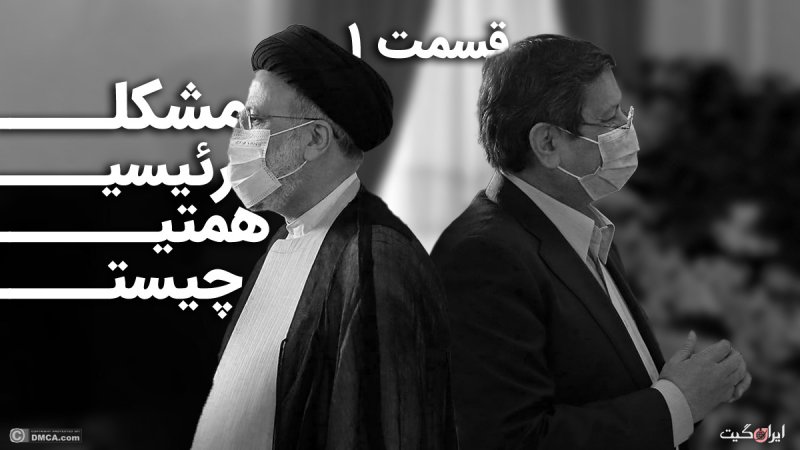What is Raisi’s Issue with Hemmati? Part One
What is Raisi’s issue with Hemmati? Abdolnaser Hemmati, the former governor of the Central Bank, has recently become the biggest critic of the thirteenth government and the Central Bank. Hemmati’s circle of criticism of Ebrahim Raisi’s government is not limited to the performance of his economic team but extends to issues such as internet speed, mandatory hijab, the approach to nuclear negotiations, and sharp criticisms have been raised by Hemmati.
However, given his managerial background in the economic field, naturally, the abundance of criticisms surrounding the economic team’s record is more than in other areas. These criticisms have often gone beyond social media and have even become the main headlines in state media and national television.
Iran Gate decided to fundamentally investigate these media disputes and determine their connection to the current living situation of the Iranian people. The present report is the first part of a three-part series titled ‘What is Raisi’s Issue with Hemmati?’ In the first part, the roots of these differences are explored, and their transition to Ebrahim Raisi’s presidency is examined.
Where Did the Story Begin?
Abdolnaser Hemmati, as one of the experienced and well-known economists and banking managers, accepted the governorship of the Central Bank at a time when Hassan Rouhani’s government was facing the Trump phenomenon in foreign policy. This issue caused the thirteenth government to face serious problems and obstacles in managing the country’s economy.
In such circumstances, Hemmati became the head of the largest economic policymaking institution in the country. The twelfth government, following the long-standing management tradition of the country, expected cooperation and collaboration from the Central Bank with the government. Looking at the history of the Central Bank, it can be seen that except for short periods, the vast majority of Central Bank governors have been fully compliant with the government’s directives.
However, Hemmati’s tenure at the Central Bank was one of the rare periods that can be described as relatively acceptable in maintaining the independence of the country’s monetary and banking policymaking institution. But the comprehensive pressure from Trump’s maximum pressure policy caused the government to even struggle in meeting its current financial needs. As previously mentioned, traditionally, governments have resorted to the Central Bank’s funds to address budget deficits.
The twelfth government, due to an unprecedented decline in oil exports, was forced to seek assistance from the Central Bank. The problem started here; Hemmati, with his independent spirit, tried not to appear as a yes-man. Although he was forced to follow orders at times, disputes arose between the Central Bank and the twelfth government’s Planning and Budget Organization, peaking in the years 2020 and early 2021.
Nobakht-Hemmati: A Fundamental Dispute
Many experts believe that the 2021 budget was the most inflationary bill in recent years after the 2022 budget, which governments have submitted to parliament. The reason for this claim was a structural budget deficit of over 400 trillion tomans. Given the decline in government oil revenues, this meant nothing other than government borrowing from the Central Bank.
Although, as mentioned, the 2022 budget was passed with a deficit of over one quadrillion tomans. Therefore, experts believe that the 2022 budget was the most inflationary of its kind. However, Hemmati, in response to the approval of the 2021 budget bill, began a media campaign and revealed the government’s debt to the Central Bank. This action by the then-governor of the Central Bank led Mohammad Bagher Nobakht, the head of the Planning and Budget Organization in the twelfth government, to react strongly to him. Hemmati, who claimed the government was indebted to the Central Bank, faced attacks from Nobakht, turning the media into a battleground for these two.
Nobakht claimed that the government did not borrow from the Central Bank, but Hemmati insisted that the borrowing was done indirectly yet had the same inflationary impact on the economy. Documents and evidence supported Abdolnaser Hemmati’s statements, although the thirteenth government did not learn from this and prepared a budget with a more than 150% larger deficit.
The 2021 Election and the Raisi-Hemmati Duality
Hemmati and Raisi entered their electoral campaign in the spring of 2021 under conditions where Abdolnaser Hemmati had resigned from his position at the Central Bank just a few weeks earlier. However, Ebrahim Raisi, seeing Hemmati as his most serious rival, began accusing him of being involved in causing inflationary surges. Although Hemmati continuously explained issues regarding the budget deficit and the government’s borrowing methods during those days, Raisi portrayed him as the cause of the current situation.
The election ended, and Ebrahim Raisi became president. The new head of government, despite his promises, submitted a budget bill to parliament that included a massive budget deficit of one quadrillion tomans.
This policy was a clumsy imitation of the 2021 budget, while Raisi constantly blamed the previous government and its policies for the current situation. However, Hemmati did not remain silent and repeatedly emphasized the continuation of inflationary policies by the thirteenth government. He repeatedly predicted the year’s inflation on social media. Many experts also warned of an economic disaster in 2022, but Raisi and his government dismissed such claims as baseless and assured the public that there would be no price hikes.
You can also read Iran Gate’s report and analysis on Raisi’s government’s failure in the currency market.
DMCA Protected Cover

